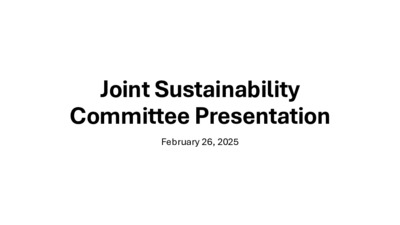3. Austin Civilian Conservation Corps Update — original pdf
Backup

Joint Sustainability Committee Presentation February 26, 2025 Agenda • Austin Civilian Conservation Corps (ACCC) Staffing • Current Agreements • Natural System Pathway • Grant Opportunities • Conclusion Personnel Juan Espinoza • Program Manager for the Austin Civilian Conservation Corps • Economic Development Department • Juan.Espinoza@austintexas.gov Kerstin Johansson • Conservation Program Coordinator for Austin Civilian Conservation Corps • Economic Development Department • Kerstin.Johansson@austintexas.gov Current Pathway and Programs Natural Systems Pathway • American Youthworks • Hungry Hill Foundation • Austin Youth River Watch American Youthworks: Two Crews Eastern Crescent • Focus Areas: Restoration, erosion control, invasive species management, forest health maintenance, trail/fence reconstruction, and integrated pest management. • Project Sites: Onion Creek Preserves, Kendra Page Park. Parks and Preserves • Focus Areas: Trail building, wildfire fuel mitigation, invasive species removal, and land management. • Project Sites: Red Bluff, Blunn Creek, Stephenson Preserves. 1. Both crews work with partners from the Parks and Recreation and Watershed Departments respectively. 2. Due to funding challenges, crews are now working with Travis County and the Trails Conservancy for project work. 3. Recruiting from TOOF and Hungry Hill Foundation and Building Promise USA. (Recruiting people who have experienced homelessness and or have been justice impacted. Hungry Hill Foundation Agreement Description Agreement Details • Supports East Austin residents transitioning from homelessness to self-sufficiency. • Provides a multi-tiered work and apprenticeship program to build job skills. • Partners with the Watershed and Parks & Recreation Departments. • Assists 65 members annually in park maintenance and litter abatement across East Austin’s parks and waterways. *With more funding, the Austin Civilian Conservation Corps will pilot place-based workforce development at the Historic Bethany Cemetery to conduct cultural and natural resource conservation training current and future WPD and PARD employees. The goal is to recruit new employees who are or have experienced homelessness and are living in the local neighborhood. Austin Youth River Watch Agreement Description Agreement Details • After-school program for high school students focused on peer mentoring and environmental education. • Conducts conservation projects on Parks and Recreation Department property. • Engages 100+ high school students and 5 • Provides students with hands-on, meaningful activities outside of school hours. interns annually. • Students analyze and publish water quality data from Austin-area creeks and rivers. • Data is reported to local and state agencies, including the Lower Colorado River Authority (LCRA). *Current partners with this vendor are the Watershed Department, Parks and Recreation Department, and Economic Development Department Natural System Projects in Urban Forestry and Green Stormwater Infrastructure • Are there projects that were put on hold due to funding/resource constraints? • Some projects were put on hold, but a core team remained active. • Urban Forestry (FY24) • Planted 400 seedlings • Mapped 480 acres of invasive species • Led volunteer groups & hosted 11 environmental education trainings • Green Stormwater Infrastructure (FY24) • Installed & maintained rain gardens at Parks & Rec, Watershed Dept., and AISD sites • Evaluated & repaired rainwater harvesting systems at Givens, Zaragoza, and Zilker Botanical Gardens Potential Future Opportunities Solar For All • EPA-funded Austin Energy program providing solar panel installations for customers. • Includes battery backup systems to stabilize the power grid and enhance community resilience. • Potential workforce training opportunity for careers in solar panel maintenance. Brownfields Job Training Grant • EPA-funded Austin Resource Recovery program focused on brownfield site cleanup and reuse. • Creates jobs in site assessments, cleanup, remediation, reuse. • Prioritizes unemployed and underemployed residents in communities affected by waste facilities and contamination. • Participants can earn certifications upon program completion. *Both of these opportunities are still in its planning stages. EDD leadership and staffing still need to review the proposed project specifics to determine whether it will commit to any of these opportunities. Summary 1. Long-Term Sustainability – Focus on securing long-term funding for continued program success. 2. Advocacy Efforts – EDD, city departments, and partners are actively advocating for ongoing program funding. 3. Collaboration – Maintaining strong partnerships to support advocacy and funding efforts.